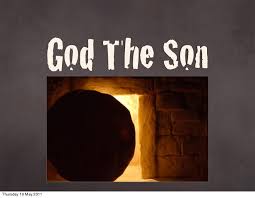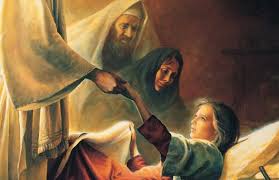A Guest post by:
Alvin Propst
Father and Follower

A Father’s plea for his little girl…One summer at the local community center a young 12-year-old girl fell into the deep end of the pool not knowing how to swim. Her father realizing that she had fallen in, dove in to get her out but had gotten there too late. He pulled her out and she had stopped breathing and had no pulse. He had no way to save her because he did not know CPR. Realizing his inability to save his own daughters life he runs to find the lifeguard and tells him what had happened. Come and save my daughters life please. Hurry, she’s already stopped breathing. You can save her. The lifeguard rushed over and performed CPR until the girl recovered despite the fact that others thought it too late to save her. The lifeguard was moved by the situation, by compassion, to not give up. How would this make you feel as a parent? Perhaps some of you can relate exactly with the parent here. Today we are going to look at a similar story from the bible involving another young girl and a desperate father. Turn with me to Matthew chapter nine. As the father walks away from his daughter in search for help his feeling of hopelessness must have been intense. Apart from a miracle he knew, like I did, that his 12 year old daughter was as good as dead. Being the devout man he was as the synagogue leader he surely had done everything he knew how to do and prayed for many many days and hours asking God for a miracle. He had done everything in his power to save her, but she still travelled towards death and he knew she didn’t have long. It is unlikely that he wanted to go to Jesus. Perhaps he had heard about all the miracles Jesus had been performing. He had tried everything he knew that God wanted him to do. He was the synagogue leader and a respected authority on God in his community, yet, in this moment, in his desperation, he had to decide whether to keep trying things his way and watch his daughter die, or to turn to Jesus, the carpenter from Nazareth, who despite ridicule and reproach was healing and restoring those no one else could. He looked at his daughter, thought about his reputation and decided that he could care less. He had done everything he knew to do. His congregation had watched him try everything as well. Whether Jesus helped him or not he decided that he was going to ask Him for help, for the life of his daughter. He knew everyone was watching and what it would mean for him to make this request. It meant probably giving up everything he held dear. You see, when he had reached the end of what he could do he realized that he could do nothing to save his daughters life. But, because he had heard of Jesus and about what Jesus could do, he knew that Jesus “could” save her if He wanted to. At the end of himself he found his dependence on Jesus. He found what many of us lack, confidence. For the observers though it would not have looked like confidence. Instead it would have looked like desperation. Because He knew Jesus could save his daughter’s life, He made himself look foolish and in that he became wise. He had tried it mans’ way. He had done all the doctors had told him. She was dying anyway. He was done trying his way, now he was going to go ask Jesus for help. He knew Jesus could help. He just didn’t know if he would be willing to come. He counted the cost. For him to go after Jesus could mean giving up everything, his home, his reputation, and his livelihood. But none of that compared with his love for his daughter. We don’t know what he was thinking, we only know what he said. “My daughter has just died; but come and lay your hand on her, and she will live.” By kneeling at Jesus’ feet he Jairus acknowledges Jesus as a God-ordained prophet. In Matthew’s version of this story he leaves out what both Luke and Mark include. In Matthew’s version when the synagogue leader comes to Jesus his daughter is already dead. In Matthew the synagogue leader doesn’t look as good as he does in Mark and Luke. He lets his daughter die before he goes to see Jesus. It was only the death of his daughter that drives him into the presence of Jesus. Is this what happened? Since it is believed that Mark wrote his gospel first what is most likely is this. Matthew wrote his gospel with a strong Jewish flavor. His goal was to reach his fellow Jews and to prove that Jesus was the Messiah. For that reason he gave his gospel a very Jewish overtone and told the same stories that Mark did in ways a Jew would be more willing to believe and listen to them. It is probable then that Matthew leaves out the instance where the synagogue leader, who we learn is named Jairus from Mark’s gospel, comes to Jesus before his daughter is actually dead. It is possible that Matthew did this to avoid making Jairus look bad in this story. He was trying to reach Jews and thus told his story with that in mind. “Matthew’s radical abbreviation of the story (23 verses in Mark, 9 Matthew!) suggests that the ruler’s daughter was already dead when he made his request, rather than that she died while Jesus was on the way. If this was so, his request was the more remarkable. Matthew clearly does not intend us, therefore, to take Jesus’ words in v 24 literally as indicating a false diagnosis (as they could be understood in Mark’s account); he must mean that her death, though real, was not permanent.” How much does this matter? Not much in fact, but it does change Jairus’ motive a little. What do I mean by that? Well, I mean that in Mark and Luke it only took the immanent death of his daughter to drive him into the presence of Jesus, but in Matthew it took her actually dying. What is most likely is that Jairus asked Jesus before she actually died and Matthew simply told the story in a way he hoped would reach more of his Jewish brethren. Recording events in this manner was completely normal for this culture and time and would not have been seen as misleading or in error.3 He was simply retelling the story with a certain audience in mind. We should consider that today ourselves when we are trying to share the stories of Jesus with specific people groups and cultures. The stories remain the same, but how we tell them should fit our audience. With that in mind lets see what we can learn from Mark and Luke that Matthew does not tell his audience. The part of the story that Matthew leaves out that speaks most loudly to me is that Jairus’ daughter was 12 years old. Only Luke gives us her age in Luke 8:42. It is because of Luke’s account we make the connection that both the little girl and the woman who is about to stop Jesus’ progress towards Jairus’ house have been troubled the same period of time, twelve years. What is the significance of twelve I wonder? We are not told but there seems to be a connection. Lets step back into Jairus’ shoes. Jesus has begun to follow Jairus towards his house. We have no words from Jesus, just his actions which indicate that Jairus’ faith has moved him to action. Imagine you are Jairus. You are walking towards your home where your daughter has died. Can you sense his urgency? Can you feel the relief perhaps that he felt when Jesus agreed to come? Now they are on the way. All of a sudden Jesus stops. Why is he stopping? We need to hurry. My daughter is dead. Who is this woman? Well I think that if this woman was important enough to stop Jesus in his tracks we should definitely pay especial attention to what happens next. Let’s change shoes. I’m taking off my father shoes and putting on my destitute woman shoes. I’m taking off the respect of the community and putting on public shame. I’m taking off the adoration of many and putting on the fact that people find me offensive for something I have no control over. You see bleeding diseases in this time made a person unclean. She would not have been able to even be in a crowd of people according to the rules of the society. In fact, for her to touch anyone else would have made them unclean for a period of time as well. Imagine how afraid she must have been and how desperate she must have been for her desperation to overcome her fear of what would happen if she was discovered in the crowd and recognized. For her to touch him would have been startling to everyone in that context.As we look at Matthew’s account of this event we are again looking at a much shorter version of the story than is found in Mark and Luke. It is from their accounts that we learn of the extent of this poor woman’s sure hopelessness. Ladies, imagine that your monthly friend came to visit and never left. You’ve been to the doctor. You’ve been to specialists. You’ve been tested and observed and watched. All the best experts have not helped you except to help you empty out everything you own in fees. Now you are destitute, penniless and an outcast among your own people. Consider what she was facing. Leviticus 15 says: “If a woman has a discharge of blood for many days, not at the time of her impurity, or if she has a discharge beyond the time of her impurity, all the days of the discharge she shall continue in uncleanness; as in the days of her impurity, she shall be unclean. Every bed on which she lies during all the days of her discharge shall be treated as the bed of her impurity; and everything on which she sits shall be unclean, as in the uncleanness of her impurity. Whoever touches these things shall be unclean, and shall wash his clothes, and bathe in water, and be unclean until the evening. If she is cleansed of her discharge, she shall count seven days, and after that she shall be clean.” (Leviticus 15:25-28 NRSV) In her condition she would not have been able to have her husband even touch her if she was married. Everything she touched would be unclean. She, for lack of better words, had nothing to lose and everything to gain. But it was a big risk. The description of the crowds in Mark and Luke’s version visualize a thick crowd. I imagine it like those we see of famous people surrounded by reporters and such. There’s no telling how many people she touched without their knowing it. She didn’t dare make herself known and had no intentions of doing so. She came close to Jesus from behind him. She had heard, She had believed, and now she was acting on her faith. If I just touch his fringe of his cloak I will be made whole. If this is all that happened then she would have touched it and walked away whole and later showed herself to the priest to be declared clean again. But this is not what happened. Matthew tells us that that Jesus turned when she touched him and told her, “take heart, daughter; your faith has made you well.” At this she was instantly restored. I do wonder however how come Matthew seems to leave out so much of what Mark and Luke include. But if we look objectively we notice that Matthew is simply doing what he did before with the synagogue leader. Matthew completely omits the crowd part of the story. Like before, Matthew is telling this story to a Jewish audience and leaves out a detail that would probably have caused many a Jew to become too offended to listen further. Perhaps he also left it out to save face for all those who were pressing in to Jesus who received nothing from him. In Matthew, Jesus knew exactly who touched him. For her faith he tells her she is now whole. She received what she believed. She risked herself and her well being, counted the cost, and reached out in faith and was rewarded for it. However in Mark and Luke Jesus asks who it is that touched him and even takes sarcasm from his disciples because of the fact that Jesus was being touched probably on all sides by the crowd. In fact in Luke 8:45, Luke’s version says everyone denies touching Jesus. This includes the woman. It was only after Jesus insists that someone touched him that the woman realizes that she is about to be exposed and comes forward. In Matthew, Jesus is a Jewish prophet who knows who touched him, in Luke and Mark Jesus either doesn’t know, or is simply letting the woman share with the crowd what she had been saved from. Careful reading of Matthew shows that the no one besides her and Jesus knows she was healed from a bleeding disorder. When she was healed she was also made clean in the sense of the Old Testament idea of wholeness. When she was healed Jesus not only restored her body, but in doing so he saved her. The word behind the words made whole here is the word for salvation. The word for salvation means more than just eternal life. It also is the word for complete healing. It means to restore. She wasn’t just healed, she was restored to wholeness. Physical contact is one method by which Jesus and his disciples healed people, echoing the OT idea that anything that touches something holy, like the altar, becomes holy itself… In fact, simply touching Jesus’ clothing is enough to bring healing. Without getting off this story I also want to point out that she is first of many to be healed by simply touching the fringe of Jesus’ cloak. One might even argue that because of her faith many others were restored after they heard about her and reached out to touch Jesus’s garments in faith themselves. To see what I’m talking about, take time in your personal bible reading to read Matthew 14:35-36. So not only did her faith save her, but it also helped save others. Now we go back to Jairus the synagogue leader. We don’t know how long this took, but you can be sure that his anxiety must have increased with every moment they spent there dealing with the woman. Jesus, in Matthew’s gospel is simply at the leader’s house right after finishing with the woman. In Matthew the flute players and the crowds are already making a commotion. You see Middle Eastern people don’t mourn silently like many of us do, they tend to mourn out loud and with great passion. It is likely the flute players were hired by someone in the synagogue leader’s home as this is normal after the death of a loved one. Think about the situation for a minute. Jairus has left the home to find Jesus. Everyone else is still there and have been looking at the dead child. They are acting on what they know. The child is dead. That is what they see. That is what they believe. When Jesus arrives he sees this and tells them to go away. He doesn’t say it nicely either. The force behind these words in the original texts goes with the imagery we might have of physically tossing someone out on the street or driving them from our homes forcefully. “The girl is not dead but sleeping,” Jesus tells them. They all laughed at him knowing she was dead. After all the people had been put outside Jesus took the girl by the hand and she got up. From Matthew’s text we can only infer that Jesus and the synagogue leader were in the house. You see Jairus was just like the rest of the people in the house who surrounded the dead child except for one thing. He believed that Jesus need only lay his hand on her for her to live. Jairus doesn’t lose his confidence in Jesus at all in Matthew’s gospel from beginning of the story to the end of it. This is yet another way Matthew portrays the synagogue leader in a positive manner to reach his Jewish audience. Mark and Luke show us a more vulnerable Jairus. In their gospels Jairus’ daughter dies while he is bring Jesus to the home. Upon hearing of her death from people who had been at his home Jesus takes time to tell him, “Do not fear. Only believe, and she will be saved.” Mark and Luke are not trying to reach a Jewish audience, they are writing primarily to non-Jewish people, gentiles. They include details that show the true humanity of Jairus and show that Jesus not only agreed to come save his daughter, but also took time to calm his fears when hope was lost. Jairus was not super human with bulletproof faith. He was like us. He believed Jesus could, but still had his emotions and his capacity to doubt. Jesus reassures him that if he continues to believe, she will be saved. We see from the girls resuscitation or resurrection that Jairus must have kept his faith. The girl was restored from death. Jesus called her situation sleep. The best I can explain it is that her heart and breathing had stopped physically, but her spirit was still there. You see when Jesus touched her he not only awakened her from death and sleep, he had to have healed her body instantly as well. As with any long-term illness the patient often stops eating long before they die. Jesus’ instructions in Mark and Luke to feed her were only natural. Jairus believed that Jesus touching his dead daughter would cause her to live. He risked everything to make the request. He counted the cost and paid the price. For his faith in Jesus he had his daughter restored to him. Don’t miss the obvious in here as well. He not only got his daughter back from the dead, he also got a healed daughter. He no longer had to watch her suffer from her illness. Jesus had completely reversed both the effects of the sickness, and defeated the power of death to hold her. His Lordship is supreme, and without a word death has to give way to his demands. Jairus’ faith, and his actions, brought Jesus to save his daughter. The woman who had bleed for twelve years. In an instant was restored. She not only was physically healed but was ritually cleansed and able to re-enter society clean. She could now return to her home without making everything she touched unclean. If she was married she could again enjoy the embrace of her husband. She was indeed saved in more than one way. A Father with only one hope. A daughter of Abraham with only one hope. What they both shared was faith that Jesus could save them from their situation. Their actions weren’t without risk for both of them risked severe repercussions should things have gone differently. These two stories are both an encouragement to me and a constant reminder of my 12-year-old daughter Cheyenne. Cheyenne was my daughter. At age 11 she was diagnosed with stage 4 Rhabdomyosarcoma, an aggressive sarcoma that kills nearly everyone that gets it. She lived for 369 days past diagnosis. Why do I bring this up? The connection is obvious to me for two reasons. Jairus’ daughter was 12 and only Jesus could save her. Doctors gave us very little hope. In fact it was a miracle that she survived as long as she did medically speaking. She went into remission from November to May. When the cancer came back the second time it came back faster and with no possible cure. We had to face reality and keep our faith. God had given me this story from the beginning of her treatments. I didn’t know what his intentions were. I only knew that I was to believe that God could heal her, even if she died. About 1 week before Cheyenne went to be with Jesus she asked me a question. She said, “Daddy, do you think I’m going to make it?” With tears in my eyes I told her that only God knows for sure, but that we were still praying for her to be healed. What she said next stunned me and my wife and taught me something I’ll never forget. “Stop it.” She said. “You should be praying for God’s will to be done, not for what we want.” I knew that she had gotten that straight from God. She believed that Jesus was going to heal her. She didn’t know how or when, but had confidence that He was going to. You see when she took her last breath here, she took her first in his presence. For a whole year she could not run or jump or do most of the things she loved before the cancer struck. Now she was whole. Thanks to God, who gave a complete stranger a vision of Cheyenne going to heaven, we got to have a glimpse of her joy upon her arrival there. They saw her running and jumping and doing cartwheels. Cheyenne is healed. Her faith in Jesus saved her. She suffered greatly on earth, but Jesus saved her from it all. You see, faith in Jesus saves always. Sometimes faith delivers us from things here on earth. Sometimes it restores things to us that the enemy takes from us. But faith in Jesus always saves. For Jairus it meant he got his daughter back healthy. For the woman she was healed and her life was restored. For Cheyenne, she no longer suffers from the pain she endured on earth. For her she was saved from death because of her faith in Jesus. Because you see, when she stopped breathing she didn’t die, she instead, for the first time, truly lives. I don’t know what you are facing today. What I can tell you is that you need to have faith in Jesus. Faith in him can deliver you from everyday troubles, but that is not the greatest salvation available. Faith in him delivers us from the last enemy, death. For those whose faith in him endures to the end, they will be saved. Many of you may be facing impossible circumstances or even death. I invite you today to place your faith in Jesus, for just one touch from the master can deliver you from all your troubles. If you don’t know Jesus or have faith in him I invite you and challenge you to ask Him to reveal Himself to you. Just like the father and the woman, Jesus will meet you where you are. If you are interested in truth He will show you, like he has showed me that putting your faith in Him is the most important thing you can ever choose to do https://www.chrisaomministries.com/2016/08/06/the-purpose-of-this-blog/ I am posting this in honor of Cheyenne, and my friend Ray Propst. |





